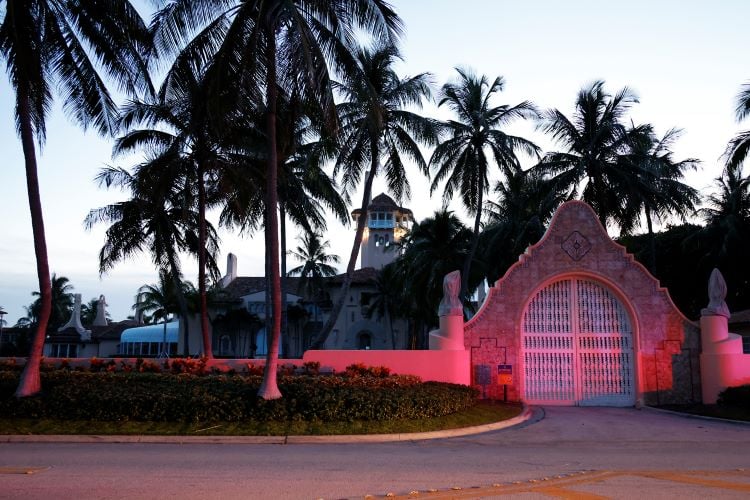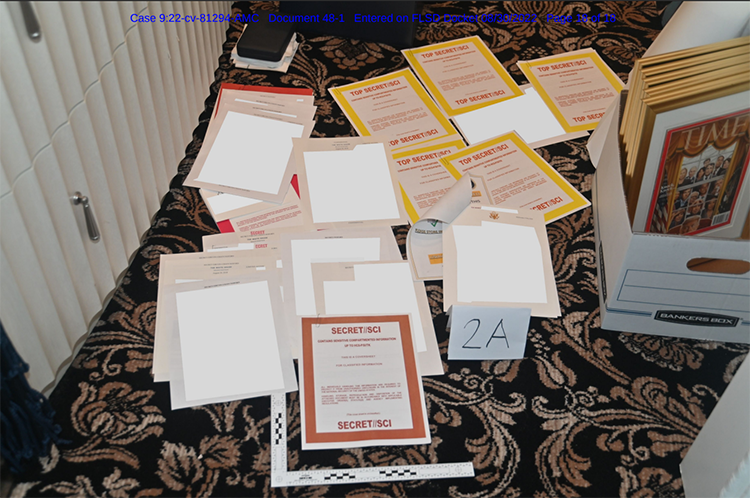As Trump faces new documents charges, prosecutors seek to keep defense discussions at secure place

The entrance to former President Donald Trump’s Mar-a-Lago estate is shown in 2022 in Palm Beach, Florida. A superseding indictment against Trump accuses him of attempting to delete security camera footage to conceal information from a grand jury. Photo by Terry Renna/The Associated Press. Adjacent image from the Department of Justice.
On the same day that a superseding indictment accused former President Donald Trump of seeking to delete security camera footage at his Mar-a-Lago home in Palm Beach, Florida, prosecutors sought a protective order to prevent Trump from discussing classified documents with his lawyers at that location.
In a July 27 motion, prosecutors sought a protective order requiring discussion of classified documents to take place at a “sensitive compartmented information facility,” which is known as an SCIF.
Trump’s lawyers say discussions should be permitted at Trump’s office in Mar-a-Lago and possibly his golf club in Bedminster, New Jersey. Prosecutors balked.
“The government is not aware of any case in which a defendant has been permitted to discuss classified information in a private residence, and such exceptional treatment would not be consistent with the law,” special counsel Jack Smith said in the filing.
“There is no basis for the defendant’s request that he be given the extraordinary authority to discuss classified information at his residence, and it is particularly striking that he seeks permission to do so in the very location at which he is charged with willfully retaining the documents charged in this case.”
The initial June 8 federal indictment against Trump alleged that Trump retained classified documents in violation of the Espionage Act. That indictment said Trump suggested that one of his lawyers falsely represent that he didn’t have subpoenaed boxes of documents and also suggested hiding or destroying the materials.
The July 27 superseding indictment against Trump accuses the former president of attempting to delete security camera footage to conceal information from a grand jury, report the New York Times, the Washington Post and the Lawfare blog.
 Related article from ABAJournal.com: “Did pending Supreme Court case affect special counsel’s decision to move Trump grand jury to Florida?”
Related article from ABAJournal.com: “Did pending Supreme Court case affect special counsel’s decision to move Trump grand jury to Florida?”
The indictment says after learning that the government was seeking surveillance footage, Trump spoke with his property manager, who in turn told a technology employee that “the boss” wanted the video deleted from the server. The tech employee allegedly replied that he didn’t know how to delete the video, and he didn’t think he had the rights to do so.
The property manager, Carlos De Oliveira, was added as a defendant in the case, which previously named Trump and his valet and aide Waltine Nauta, who was accused of moving 64 boxes of documents out of a storage room and returning only 30. The movement of boxes was shown on the surveillance video. The superseding indictment says De Oliveira aided in that effort.
The three new counts against Trump in the superseding indictment allege obstruction by trying to alter, destroy or conceal evidence; inducing someone else to destroy evidence; and violating the Espionage Act in connection with an alleged discussion of a top-secret document at Bedminster, New Jersey.
During the Bedminister, New Jersey, meeting, Trump said in a recorded conversation about the document: “As president I could have declassified it. … Now I can’t, you know, but this is still a secret.”
Hat tip to Bloomberg Law for its coverage of the dispute on the location for discussing documents.
See also:
ABAJournal.com: “CNN obtains transcript of tape that is highlighted in unsealed espionage charges against Trump”
ABAJournal.com: “How Rule 29 motion could save Trump in classified documents case; what are other possibilities?”
ABAJournal.com: “Who filed phony document in Trump Mar-a-Lago search case?”
ABAJournal.com: “Could Trump be banned from office if he’s convicted of taking government documents?”
ABAJournal.com: “DOJ files motion to unseal warrant, property receipt relating to search of Trump’s home”



